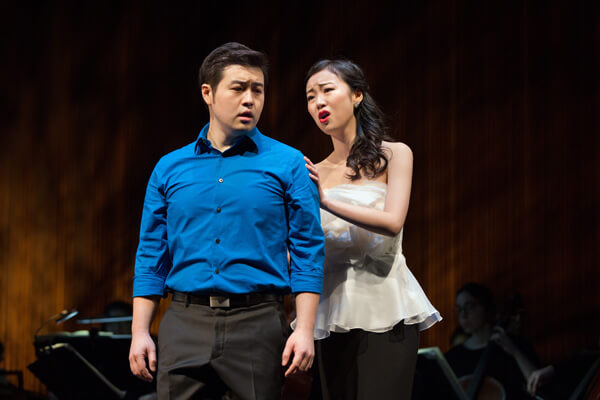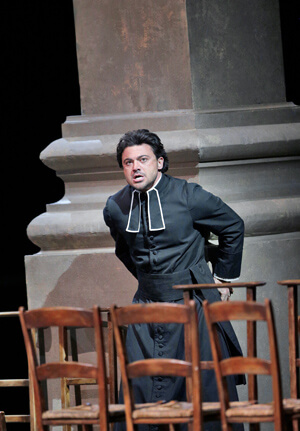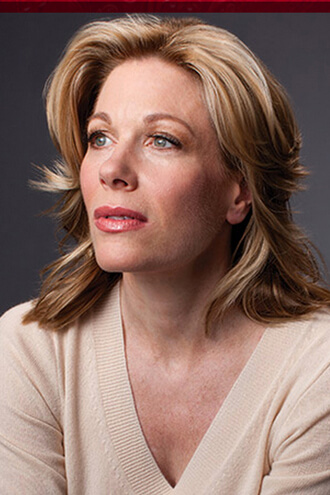Miles Mykkanen, Liv Redpath, and Theo Hoffman in Mary Birnbaum's production of Mozart’s “Die Zauberfloete” at Juilliard. | RICHARD TERMINE
James Levine got hero’s welcomes before, after, and during April 13’s Met “Simon Boccanegra.” That has become standard for the music director as he is — well, “eased out” is not how one would put it. When I can, I now avoid Levine’s first nights. By a few shows in, thanks to long experience with Verdi, the house’s fine music staff, and the orchestra Levine has done so much to build, one could enjoy a pretty solid performance — though the opera’s heart, the Council Chamber scene, was not what it was under Levine in 1984 or 1995 or even 2010.
Of the baritone assumptions that super-veteran tenor Plácido Domingo has undertaken, Simon Boccanegra has proved the most congenial. That doesn’t mean that it’s fully successful, especially now when the artist simply can’t sustain long lines and tends to jump the beat to avoid running out of gas altogether. But the part fits his patriarchal stature and clearly evokes a more detailed emotional response in him than have such folly-driven enterprises as Carlo in “Ernani,” and though he sounds like a tenor at all times, the tone can still emerge handsomely most of the time.
Time hasn’t stood still for Ferruccio Furlanetto’s bass either, but after a slowish start he warmed up his instrument and delivered a full-out, nuanced performance of genuine dramatic stature. The evening’s best singing came flowing out of Joseph Calleja, badly wigged here but a superb Gabriele Adorno in every way, his tenor a throwback in quality and technique to at least some kind of Golden Age.
Met, Juilliard, OONY offerings
Lianna Haroutounian, whose debut in “Don Carlo” a year ago proved highly commendable and promising, did not quite fill out the larger scale Amelia’s music needs, and barely marked the important trills. Still, she’s an idiomatic, capable full lyric soprano when the Met sorely lacks many such. Plus, Haroutounian sings with vigor and point, not the bland, homogenized sound too frequently favored today. But, please: this singer is not a Norma!
San Francisco Opera has been successfully deploying strong baritone Brian Mulligan for some time; finally the Met seems to have taken notice that he’s a Verdi baritone in formation. He was the perfect casting for Paolo, a part which has nurtured future stars like Leonard Warren and Sherrill Milnes along their way to taking on Boccanegra. Mulligan sounded almost too elegant for the frustrated roisterer, but it was nice to hear some genuine quality baritonal sound in the mix during Domingo’s somewhat “let’s pretend” evening. Mulligan — or Stephen Powell or Juan Jesús Rodriguez — would all be better casting for Verdi’s Posa in two seasons, with which Domingo’s vocal and dramatic resources have nothing whatsoever in common. Tenor Noah Baetge sounded healthy in the Captain’s brief but exposed duties. Past the cramped Prologue, Michael Scott’s set remains highly pictorial if historically inaccurate.
Mary Birnbaum directed a fascinating “Eugene Onegin” at Juilliard two years ago. Some ideas and images in her “Die Zauberfloete” (April 19) proved fascinating, but for me the whole did not coalesce into a coherent reading or an experience conveying much sense of a journey of maturation — or of magic of any sort. The entire challenge and trials of Tamino and Pamina were manipulated from the opera’s start; the Queen’s forces and the Temple brotherhood seemed totally in cahoots. An almost Ponnelle-ish level of silent unscripted characters onstage prevailed.
Question: why do virtually all directors bring the animals responding to Tamino’s flute on two beats too soon, killing the wonder?
A first-rate musician and actor, Miles Mykkanen (Tamino) showed a somewhat dry but beautifully deployed tenor. Pleasingly, Christine Taylor Price was much feistier physically and vocally than the usual Pamina; she stood her ground against male oppression. Her soprano may eventually suit Wagner and Strauss; if so, this was a good exercise.
Irrepressibly livewire Theo Hoffman sounded sensational as Papageno: I’m going to miss hearing him when he departs for the Los Angeles Young Artists program. Liv Redpath looked gorgeous as the Queen of the Night and sang quite well in a very light voice: three out of five high Fs were hit. Redpath, also SoCal-bound, has the ingredients for a career in today’s environment, but I don’t think the Queen will linger long in her repertory.
Önay Köse, a good bass, didn’t have quite the interpretive or vocal depths for Sarastro, who here seemed to be a kind of charismatic cult leader. All references to Monostatos’ essential otherness vanished, as did his troubling and usually tiresome sub-slaves. Alexander McKissick sang his music with considerable grace and played him as a Mean Ex-Boyfriend — or perhaps the excluded Jud Fry of the community, a Monostatos certainly as handsome as the Tamino. That made the romantic dynamics interesting.
Excellent work in smaller roles came from Avery Amereau (Third Lady), Kara Sainz (Papagena), Fan Jia (First Priest), and Matthew Swensen (Second Priest). David Stern led the Juilliard Orchestra, bedeviled only rarely with opening night blips, with welcome dispatch.
Dispatch was not the order of the day at OONY’s “Parisina d’Este” (May 4), one more entry in the city’s nearly all-Donizetti diet. As always, one appreciated Eve Queler letting us hear an obscure, worthy score (she led Monserrat Caballé and Louis Quilico in it in 1974!), but the evening, though wildly applauded, struck me as rather lackluster. Donizetti always has some touches of formal interest. Here, that meant two splendid proto-Verdian quartets, plus the balancing of act-opening movements for chorus and soloist (all male in Act One, all female in Act Two). Beyond that, the score felt competent and formulaic rather than inspired.
One might say the same of the musical performance, though all four leads offered something of quality. Angela Meade compelled admiration for her preparation, and the instrument has its beautiful places. One wishes for more individuality and specificity.
In his New York debut, Aaron Blake, showed dramatic intelligence and a sense of style, with an interesting high–placed tenor perhaps more suited to Rossini than the elegiac music of Ugo. In the mean guy role of Parisina’s husband, Yunpeng Wang’s well-focused baritone supplied some fine sounds without showing complete technical mastery or much expression in the tone itself.
Young bass Sava Vemic — much ballyhooed online for his height and looks — has a fantastic instrument, but it has far too much tonal bite to hew a bel canto line; like Meade and Blake, he too frequently shaded flat. Everyone held to Queler’s antiquated house style of reckless interpolations and holding final notes until the orchestra stopped.
David Shengold (shengold@yahoo.com) writes about opera for many venues.




































